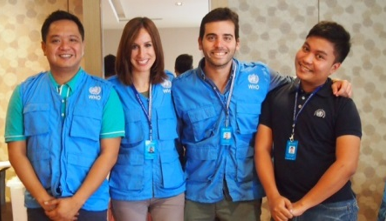World Field Epidemiology Day 2023: increasing diversity, equity and inclusion
When it comes to providing decision-makers with the necessary information to develop effective health policies, field epidemiologists have a key role to play as they protect the health of populations and contribute to the protection and strengthening of health security worldwide. This year’s World Field Epidemiology Day focuses on promoting diversity, equity and inclusion in the field of epidemiology.

World Field Epidemiology Day, marked on 7 September each year, recognises the role of field epidemiologists in public health, and advocates for more investments in field epidemiology and research. In their day-to-day work, field epidemiologists investigate public health signals to confirm disease outbreaks and identify cases, contacts, and risk factors for disease. With their activities, they advance evidence-based knowledge that in turn strengthens public health policies and interventions.
The European Centre for Disease Prevention and Control (ECDC) is responsible for running the European Programme for Intervention Epidemiology Training (EPIET) and the European Programme on Health Microbiology (EUPHEM), covering the European Union and EEA Member States as well as the Mediterranean and Black Sea Programme for Intervention Epidemiology Training (MediPIET), covering the European Neighbourhood Policy (ENP) partner countries.
Addressing the 2023 theme of 'increasing diversity, equity and inclusion in field epidemiology', Adam Roth, Head of the Fellowship Programmes at ECDC, said:
“In 2021 we started running the MediPIET programme alongside the ECDC Fellowship Programme (EPIET & EUPHEM). This integration has added strength and value to the programmes by incorporating a diverse geographical and cultural perspective. Our fellows have wholeheartedly adopted this inclusive approach, leading to a dynamic exchange of knowledge and mutual learning. These interactions are rooted in their varied professional experiences, settings, and systems. Emphasizing diversity has shown immense potential for training in field epidemiology, and we are only beginning to tap into its full possibilities”.
In order to achieve stronger and more resilient health systems that are prepared and responsive to health emergencies, outbreaks and pandemics, World Field Epidemiology Day serves as a platform to encourage policymakers worldwide to put mechanisms in place that empower field epidemiologists in their work.
Apply to become an ECDC fellow
If you are interested in a career in field epidemiology or public health microbiology, now is the time to apply for the next cohort of the ECDC Fellowship Programme. Starting in autumn 2024, the two-year hands-on training enables fellows to support prevention, preparedness and surveillance activities, outbreak investigation and control of communicable disease threats across the European Union and European Economic Area – and beyond. Application deadline: 15 October 2023.
Learn more
ECDC fellowship experiences
To mark World Field Epidemiology Day 2023, ECDC has published a series of videos of professionals sharing their experiences as part of the ECDC Fellowship Programme (EPIET & EUPHEM) and MediPIET.
ECDC on air
You can listen to two ECDC On Air podcast episodes to get an idea of what the work of a field epidemiologist is like:
Eurosurveillance articles
Factsheet on MediPIET
MediPIET is a training programme aimed to enhance health security in the Mediterranean and the Black Sea region.
Training Programs in Epidemiology and Public Health Interventions Network (TEPHINET)
Background
World Field Epidemiology Day was observed for the first time in 2021 and is coordinated by the network of Training Programs in Epidemiology and Public Health Interventions Network (TEPHINET) which includes the ECDC Fellowship Programme.







